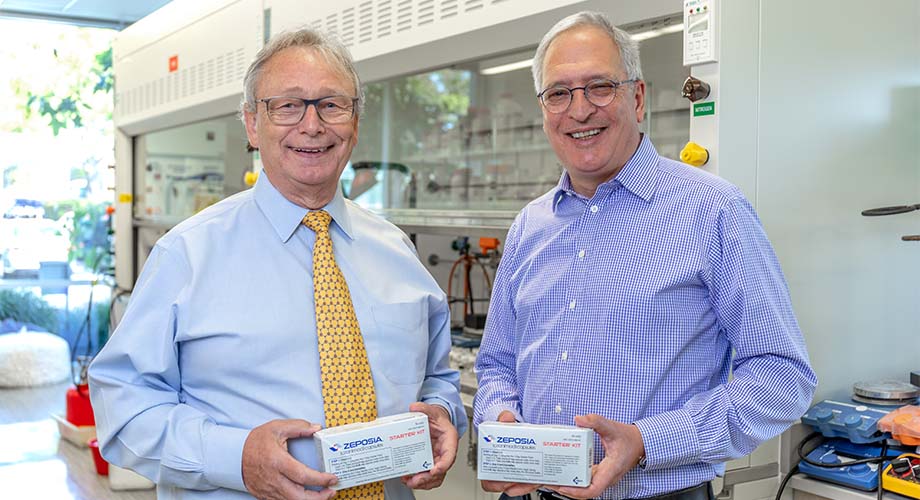
Edward Roberts, PhD, (left) and fellow Scripps Research professor Hugh Rosen, MD, PhD, invented ozanimod (marketed as Zeposia), which addresses overactive immune responses. The novel drug was approved for multiple sclerosis in 2020 and now is approved for ulcerative colitis.
A new indication of success: FDA approves ozanimod for ulcerative colitis
The novel drug created at Scripps Research has achieved a second FDA approval, this time for ulcerative colitis, as clinical trials continue for Crohn’s disease.
May 27, 2021
LA JOLLA, CA—Ozanimod, the drug invented at Scripps Research that won FDA approval last year for relapsing forms of multiple sclerosis, has been approved in the United States for a second high-need medical condition, ulcerative colitis.
The once-daily oral drug, sold by Bristol Myers Squibb under the name Zeposia, can now be prescribed to treat adults with moderate to severe forms of the inflammatory bowel disease. Notably, it’s the first drug in a novel class of immune-modulating compounds to be approved for ulcerative colitis, which affects about 1 million people in the United States.
“For patients with ulcerative colitis, this oral drug offers a better and more convenient option to control disease progression and improve quality of life,” says Hugh Rosen, MD, PhD, who invented ozanimod along with fellow Scripps Research professor Edward Roberts, PhD, and their laboratory colleagues. “The hope is that this will lead to fewer dangerous complications or serious infections than current treatment options, providing a steadier path for newly diagnosed patients as well as those failing other treatments.”
Ulcerative colitis is a relapsing, chronic autoimmune disease of the large intestine and rectum, in which the lining of the colon becomes inflamed and develops tiny open sores, or ulcers. The condition, as with other inflammatory bowel diseases, is driven in large part by an overactive immune response.
The need for a new treatment option is great, as many patients with ulcerative colitis have an inadequate response or do not respond at all to currently available therapies. Existing therapies also come with a significant risk of serious infections including tuberculosis and blood clotting.
In a randomized and blinded phase 3 clinical study that led up to the expedited FDA approval, more than 600 ulcerative colitis patients taking ozanimod were compared with more than 300 patients on placebo. A far higher share of patients who took ozanimod for 10 weeks experienced remission, meaning that symptoms decreased to the point that they were mostly absent or gone. The onset of improvement was rapid, with many patients reporting decreased symptoms and rectal bleeding starting in the second week of therapy, and the percentage responses increasing with time on therapy.
At week 52 of the clinical trial, patients on the drug also maintained their remission at a high rate. In addition, the study met secondary endpoints for clinical response—noting a marked decrease in disease activity—and endoscopic improvement, which refers to healing of the mucosal tissue in the colon and rectum.
Taken daily as a capsule, ozanimod is the first in a class of drugs known as “sphingosine 1-phosphate receptor modulators” to be approved for ulcerative colitis. The drug works by acting on certain types of immune cells called lymphocytes that are centrally involved in the autoimmune attack on the large intestine. It binds to receptors on the cells’ surface, diminishing the immune system’s ability to inflict damage.
Ozanimod is also in late-stage clinical trials for the treatment of Crohn’s disease, another type of inflammatory bowel disease. While ulcerative colitis affects the colon and rectum, Crohn’s disease may act on any part of the gastrointestinal tract and also affect the entire thickness of the bowel wall.
“It has been tremendously emotionally and intellectually satisfying for us to see this drug advance from discovery and early lab studies to regulatory approvals for multiple sclerosis, ulcerative colitis and hopefully Crohn’s disease in the future,” Rosen says. “The impact of these diseases on patients and their families cannot be overstated. Through our work, we continue to strive for each and every person around the world who is living with these and other diseases.”
Additional molecules developed by Rosen and Roberts at Scripps Research are currently in phase 2 clinical trials for major depressive disease and anxiety, and phase 1 studies for treatment of autism.
The fundamental discoveries that led to ozanimod were reported by Rosen, Roberts and their Scripps Research colleagues in a series of papers from 2002 to 2008. In 2009, Scripps Research licensed ozanimod to biotechnology startup Receptos, which Celgene purchased in 2015 for $7.2 billion. Celgene was acquired by Bristol Myers Squibb in 2019.
For more information, contact press@scripps.edu

